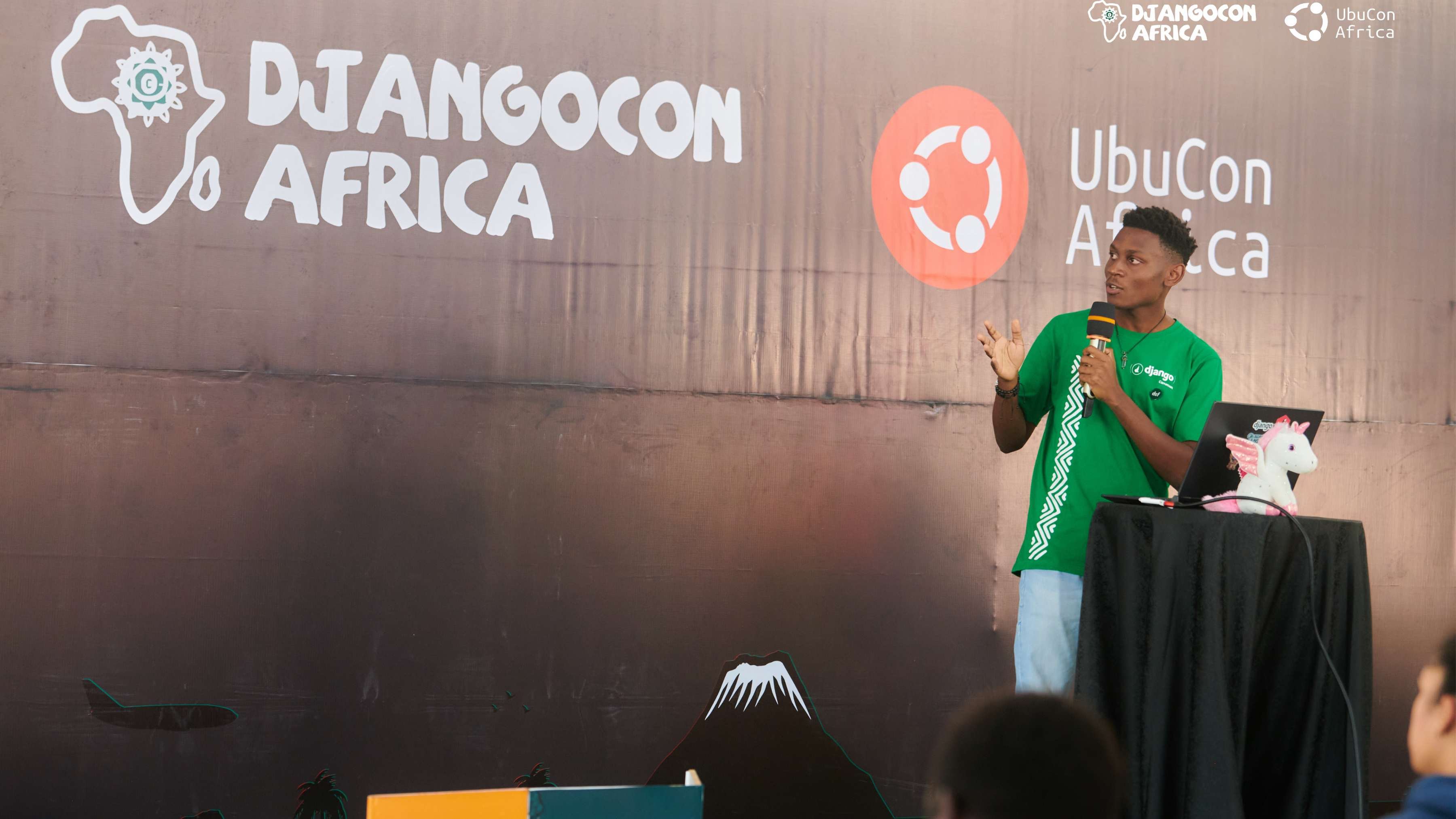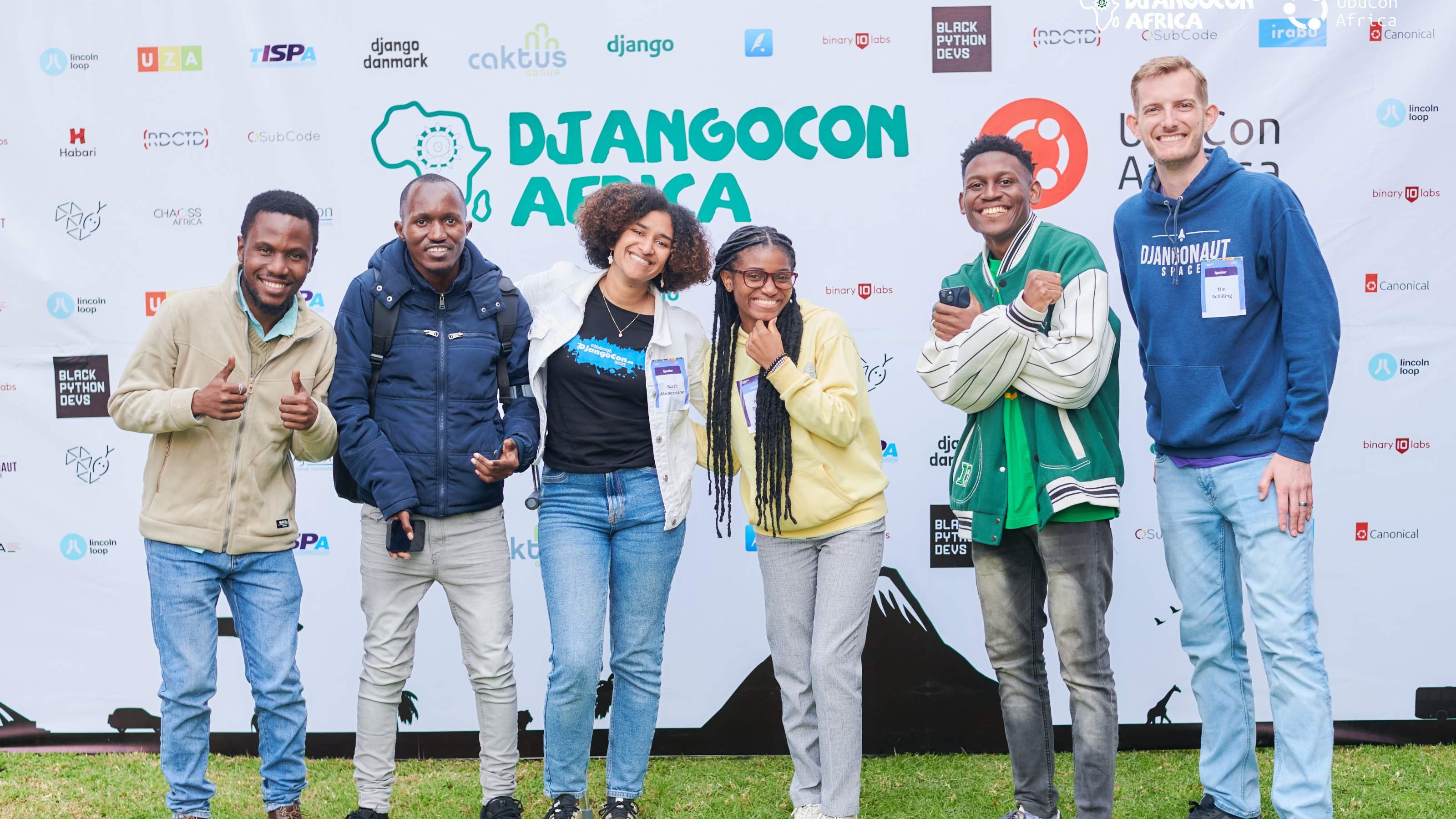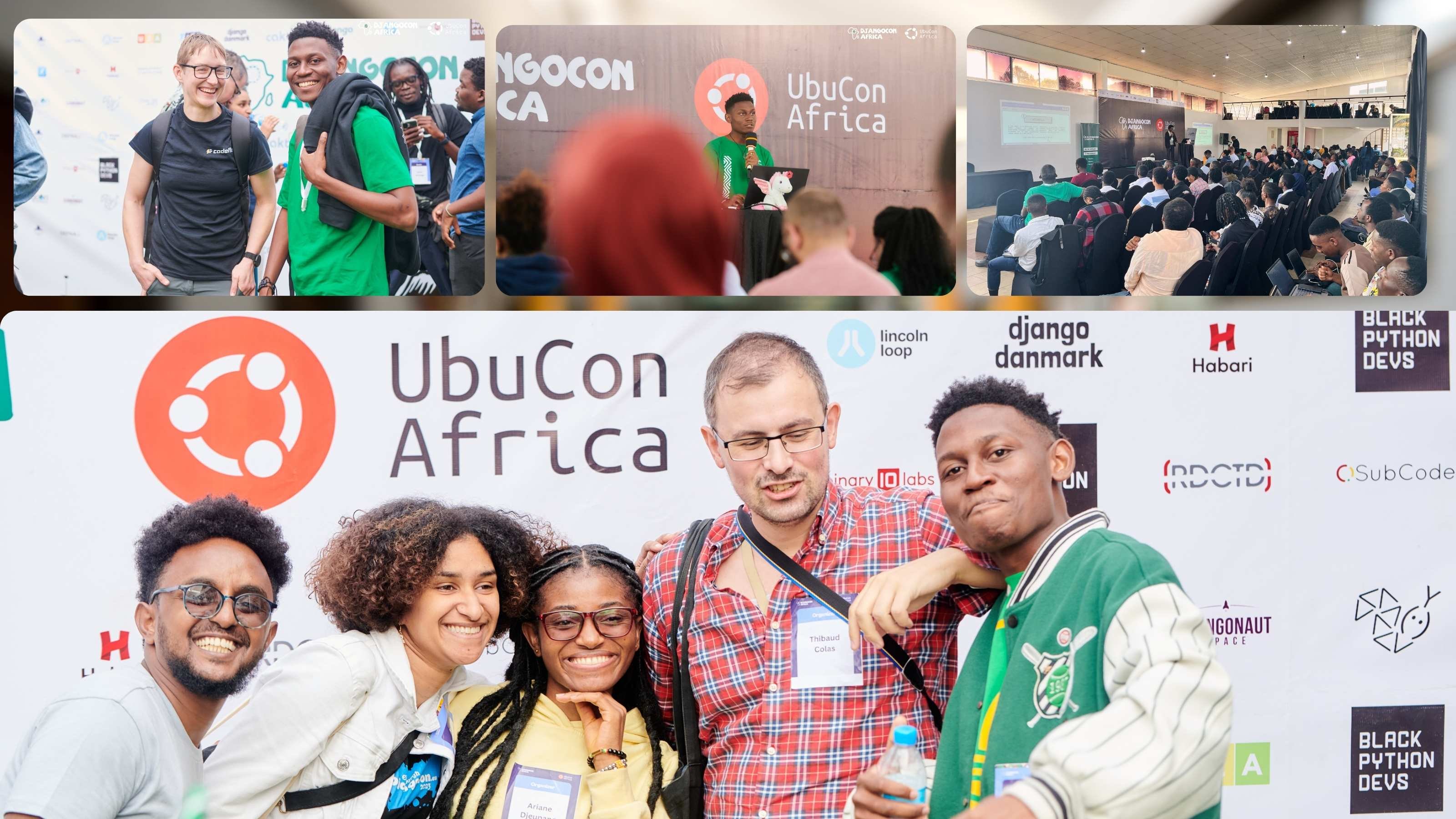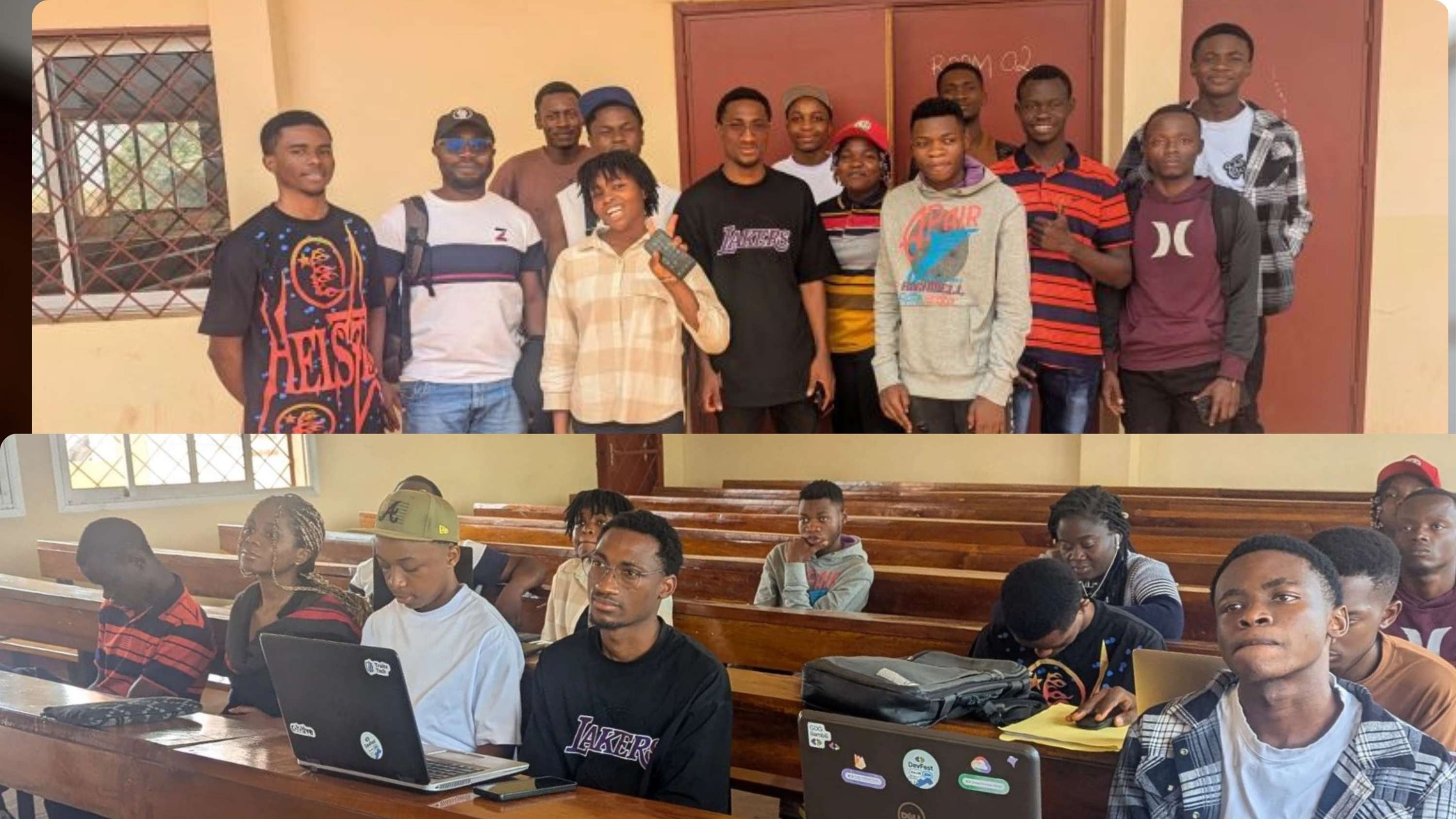Remote Work and Django in Cameroon: An Interview with Edmond Makolle
For Edmond, being a developer has always been about more than just writing code. It’s about freedom, the freedom to work from anywhere in the world with nothing more than a laptop and an internet connection. Remote work, to him, isn’t simply a job choice; it’s a lifestyle that matches his love for learning, sharing, and building communities. For many, it’s an inspiring example of a work-from-home alternative that offers flexibility, independence, and creativity.
DjangoCon Africa 2025 became a turning point in his story. It was his first time speaking at an international conference, and even more, it was his first talk delivered in English, a language he doesn’t usually use day to day since he speaks French back home. Standing on that stage, sharing his ideas with a diverse audience, was a game-changer. Edmond told me he was “a little nervous at first, but seeing people nod and smile as I spoke really gave me confidence.” In that moment, he realized that his voice, his work, and his perspective mattered not just in Cameroon, but across the continent.

What made the conference even more special was the chance to connect with other remote workers living the remote lifestyle. Each person had a unique story to tell, about how they started working remotely, the tools they use every day, and how they contribute to open source while building their careers. For Edmond, these conversations opened his eyes. He came to see that remote work is not only about independence and flexibility but also about collaboration without borders, and being part of something bigger than yourself.
In this interview, Edmond shares his journey as a remote worker, the challenges he has faced, the AI tools for remote workers that keep him productive, and how his work as an organizer of Django Cameroon is helping to shape the next generation of developers in his country.
1. Can you introduce yourself and your remote work setup?
Hi! I am Edmond Makolle, from Cameroon, a backend engineer working mainly with Python frameworks such as Django, Rest Framework and FastAPI. I like to implement backend systems that communicate with several services, and introduce AI tools for remote workers into my applications.
2. What inspired you to pursue remote work, and how has it impacted your career?
To answer this question, it would first be necessary to explain why I chose the Developer's job. I had always dreamed of this life in which I could work from any place in the world, as long as I have my machine. So we can say that my goal has always been this flexibility in my place and my working hours.
My first remote job allowed me to have another working vision, another development approach, and it gave me the chance to share this mindset with my community. I must admit that it also allowed me to have financial independence, which is not easy to obtain in my environment. For me, finding remote jobs has been key to achieving this remote lifestyle and independence.
Moments of Fun at DjangoCon
Beyond talks and workshops, DjangoCon Africa was also about meeting people and having fun. Edmond shared a memorable moment when the attendees gathered for a group photo. “It was a bit chaotic at first,” he laughed, “trying to get everyone in frame, people joking around, taking selfies at the same time. But it was great—everyone was laughing, sharing stories, and just enjoying the moment.”

For Edmond, these casual moments were just as valuable as the formal sessions. They offered a chance to connect on a personal level, see the human side of remote work, and build friendships across borders. Even in the midst of remote jobs and serious discussions about technology, he reminded us that having fun and making memories is part of the remote lifestyle too.

3. How do you maintain productivity, and which AI tools do you rely on?
With so much going on between work, learning, and communities, it is difficult to maintain productivity. But I try to organize myself with daily tasks. Sometimes I make a to-do list on paper, it just works better than a fancy app for me!
The AI tools for remote workers that I generally use to facilitate the task in my work and community contribution are Claude AI and ChatGPT. But I am open to any proposal. These tools help me focus on the most important tasks while managing multiple responsibilities in my work-from-home alternative setup.
4. How do you handle connectivity challenges, especially while traveling?
It's a really stressful problem, I have to admit. Usually, I try to find WiFi at an airport or cafe and get done what I can as quickly as possible. When I enter a new country, I usually get a local eSIM to stay connected. It’s a small lifesaver for anyone pursuing writing remote jobs or other remote jobs that need reliable internet.
5. How do you see remote work evolving with AI and eSIM technology?
For me, remote work will be the means of work of the future. Perhaps it will require shorter, focused sessions, not a full long day. I think that with improved eSIM technology, it will be possible to work anywhere, with a single eSIM connecting you to the Internet. Combined with AI tools for remote workers, this will make remote jobs more efficient and accessible than ever.
Django Cameroon: Growing a Local Tech Community
Outside of his personal career, Edmond is also an organizer of Django Cameroon. The community brings together developers across the country to learn Django, share knowledge, and support each other through meetups, workshops, and mentorship.
For many young developers in Cameroon, joining Django Cameroon is a way to get started in tech, meet others with the same interests, and discover opportunities they might not have known before. The community has also hosted events like Django Girls workshops, helping beginners, especially women, take their first steps into programming.

Edmond says the lessons he learns from remote work, staying organized, using AI tools for remote workers, and collaborating across time zones, are the same lessons he shares with his community. For him, it’s not just about working remotely; it’s about helping others see that these opportunities, whether in remote jobs or a work-from-home alternative, are possible too.
Wrapping
Edmond’s story is more than just one developer’s path into remote work, it’s a glimpse into how opportunity, community, and courage can change someone’s outlook. His first talk at DjangoCon Africa, delivered in English for the very first time, was not only a personal achievement but also a moment that symbolized what is possible for many other developers across Africa. Even small things, like seeing a student nodding during his talk, reminded him why sharing knowledge matters.
For Edmond, remote work is not simply about earning a living from his laptop. It’s about freedom, learning, and sharing. It has given him financial independence, a chance to collaborate with teams across borders, and, most importantly, a new vision that he brings back to his community. Through Django Cameroon, he helps others see that the world of tech is open to them too, whether they want to start coding, contribute to open source, explore writing remote jobs, or take up other remote jobs.
What makes his journey so inspiring is how it speaks directly to French-speaking African developers who often hesitate to step into global spaces because of language barriers or lack of visibility during our conversation. Edmond proved those barriers can be overcome. By taking that bold step at DjangoCon Africa, he showed that confidence grows when you share your story, and that the world is eager to listen.
In the end, Edmond reminds us that remote work is more than a trend, it’s a bridge. A bridge between local communities and global collaboration, between learning and teaching, between personal growth and collective progress. And through stories like his, we see how open source and remote jobs together can create new possibilities, not just for individuals, but for entire communities.
